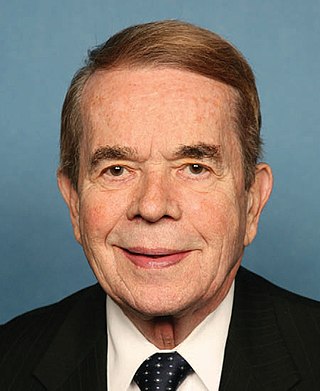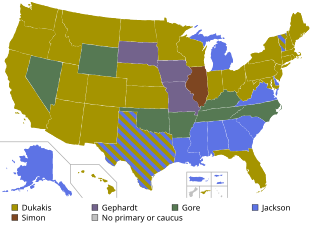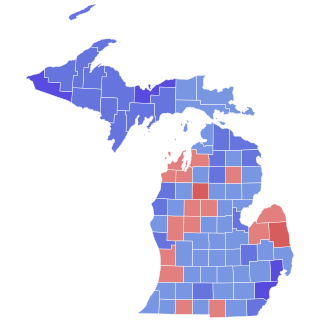
Dale Edward Kildee was an American politician who served as U.S. Representative of Michigan from 1977 to 2013. He was a member of the Democratic Party.

The 1986 United States Senate elections were elections for the United States Senate. Held on November 4, in the middle of Ronald Reagan's second presidential term, the 34 seats of Class 3 were contested in regular elections. The Republicans had to defend an unusually large number of freshman Senate incumbents who had been elected on President Ronald Reagan's coattails in 1980. Democrats won a net of eight seats, defeating seven freshman incumbents, picking up two Republican-held open seats, and regaining control of the Senate for the first time since January 1981. This remains the most recent midterm election cycle in which the sitting president's party suffered net losses while still flipping a Senate seat.

The 1984 United States Senate elections were held on November 6, with the 33 seats of Class 2 contested in regular elections. They coincided with the landslide re-election of President Ronald Reagan in the presidential election. In spite of the lopsided presidential race, Reagan's Republican Party suffered a net loss of two Senate seats to the Democrats, although it retained control of the Senate with a reduced 53–47 majority.

The 1982 United States Senate elections were held on November 2, 1982. They were elections for the United States Senate following Republican gains in 1980. The 33 Senate seats of Class 1 were up for election in 1982. A total of four seats changed hands between parties, with Democrats winning seats in New Jersey and New Mexico, and Republicans taking seats in Nevada and the seat of the lone independent, Senator Harry Byrd Jr., in Virginia. Democrats made a net gain of one seat bringing them to 46 seats, while Republicans stayed at 54 seats for a majority. However, the Democratic gain in New Jersey replaced a Republican that had been appointed earlier in the year. Liberal Republicans senators in Connecticut, Rhode Island and Vermont held onto their seats, keeping the Senate in Republican hands.

The 1980 United States Senate elections were held on November 4, coinciding with Ronald Reagan's victory in the presidential election. The 34 Senate seats of Class 3 were contested in regular elections. Reagan's large margin of victory over incumbent Jimmy Carter gave a huge boost to Republican Senate candidates, allowing them to flip 12 Democratic seats and win control of the chamber for the first time since the end of the 83rd Congress in January 1955. This was the first time since 1966 that any party successfully defended all their own seats.

The 1978 United States Senate elections were held on November 7, in the middle of Democratic President Jimmy Carter's term. The 33 seats of Class 2 were contested in regular elections. Special elections were also held to fill vacancies.

The 1976 United States Senate elections was an election for the United States Senate. Held on November 2, the 33 seats of Class 1 were contested in regular elections. They coincided with Democrat Jimmy Carter's presidential election and the United States Bicentennial celebration. Although almost half of the seats decided in this election changed parties, Carter's narrow victory did not provide coattails for the Democratic Party. Each party flipped seven Senate seats, although, one of the seats flipped by Democrats was previously held by a Conservative.

The 1970 United States Senate elections was an election for the United States Senate. It took place on November 3, with the 33 seats of Class 1 contested in regular elections. Special elections were also held to fill vacancies. These races occurred in the middle of Richard Nixon's first term as president. The Democrats lost a net of three seats, while the Republicans and the Conservative Party of New York picked up one net seat each, and former Democrat Harry F. Byrd Jr. was re-elected as an independent.

The 1968 United States Senate elections were elections for the United States Senate. Held on November 5, the 34 seats of Class 3 were contested in regular elections. They coincided with the presidential election of the same year. The Republicans picked up five net seats in the Senate. This saw Republicans win a Senate seat in Florida for the first time since Reconstruction.

The 1964 United States Senate elections were held on November 3. The 33 seats of Class 1 were contested in regular elections. Special elections were also held to fill vacancies. They coincided with the election of President Lyndon B. Johnson by an overwhelming majority, to a full term. His Democratic Party picked up a net two seats from the Republicans. As of 2023, this was the last time either party has had a two-thirds majority in the Senate, which allowed the Senate Democrats to override a veto, propose constitutional amendments, or convict and expel certain officials without any votes from Senate Republicans. However, internal divisions would have prevented the Democrats from having done so. The Senate election cycle coincided with Democratic gains in the House in the same year.

Marvin Leonel Esch was an American politician from the U.S. state of Michigan and a member of the Republican Party. He served in the U.S. House of Representatives from 1967 to 1977 before unsuccessfully seeking a seat in the United States Senate in the 1976 election. Following his political career, Esch became active in business and political activism, becoming director of public affairs for the U.S. Steel Corporation and director of programs and seminars for the American Enterprise Institute.

From February 8 to June 14, 1988, voters of the Democratic Party chose its nominee for president in the 1988 United States presidential election. Massachusetts governor Michael Dukakis was selected as the nominee through a series of primary elections and caucuses culminating in the 1988 Democratic National Convention held from July 18 to July 21, 1988, in Atlanta, Georgia.

The 1994 United States Senate election in Michigan was held November 8, 1994. Incumbent Democratic Senator Don Riegle decided not run for re-election. Spencer Abraham won the open seat, becoming the first and so far only Republican to win a U.S. Senate race in Michigan since Robert P. Griffin in 1972 and the first to win the state's Class I seat since Charles E. Potter in 1952. As of 2024, this is the last time that a man won the Class 1 Senate seat in Michigan.

The 1988 United States Senate election in Michigan was held on November 8, 1988. Incumbent Democratic U.S. Senator Don Riegle won re-election to a third term. Despite George H. W. Bush’s landslide victory in Michigan and the rest of the country, Riegle’s margin of victory increased from the previous one.

The 1978 United States Senate election in Michigan was held on November 7, 1978. Incumbent Republican U.S. Senator Robert P. Griffin ran for re-election to a third term, but was defeated by the Democratic candidate, Detroit City Council President Carl Levin.

The 1958 United States Senate election in Michigan was held on November 4, 1958.

The 1964 United States Senate election in Michigan took place on November 3, 1964. Incumbent Democratic U.S. Senator Philip Hart was re-elected to a second term in office over Republican Elly Peterson.

The 1970 United States Senate election in Michigan took place on November 3, 1970. Incumbent Democratic U.S. Senator Philip Hart was re-elected to a third term in office over former First Lady of Michigan Lenore Romney.

The 1980 United States Senate election in Kansas took place on November 4, 1980. Incumbent Republican U.S. Senator Bob Dole was re-elected to his third term in office, after briefly campaigning for President earlier that year. He defeated Democrat John Simpson, who had previously served in the Kansas State Senate as a Republican.

The 1982 United States Senate election in Michigan took place on November 2, 1982. Incumbent Democratic U.S. Senator Don Riegle was re-elected to a second term in office, defeating Republican U.S. Representative Philip Ruppe.























